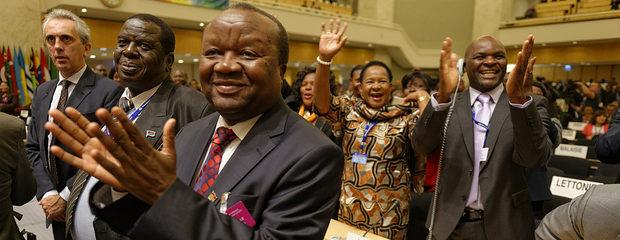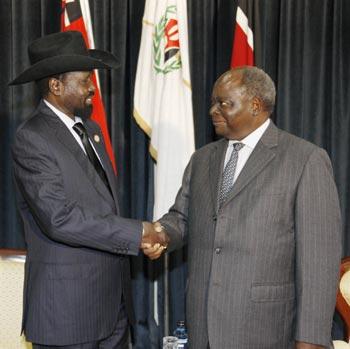Malawi faces toughest, most high-profile trial yet in massive Cashgate scandal

Will state bodies be able to put aside their differences to prosecute close associates of former president Joyce Banda accused of stealing millions from the government?

Malawi officials cheer then president Joyce Banda’s speech at the ILO in 2013. Credit: Marcel Crozet / ILO.
For more than three years now, Malawi has been in the throes of a corruption scandal unprecedented in its scope and scale.
Dubbed Cashgate because of the huge sums money discovered in the homes and cars of civil servants and businesspeople, the case has seen scores of senior figures implicated and many convicted of systematically embezzling millions of government funds.
When the scandal first came to light in September 2013, several donor governments suspended budget support, leading to serious funding shortages, while investor confidence in the country has plummeted.
A forensic audit into the graft in 2014 found that over $32 million was misappropriated within just six months in 2013. But more recent estimates suggest that the theft of government money had been going on since at least 2009 and that more than $280 million might have been stolen.
A string of investigations and criminal trials have been launched, and 13 civil servants and businesspeople have so far been found guilty of theft and money laundering. They are serving sentences ranging between three and eleven years. But it has become clear that the main players are still yet to be convicted.
However, Director of Public Prosecutions Mary Kachale hopes this will change in the most high-profile trial yet, which recommenced this January. It is scheduled to be concluded by the end of this year, though this seems unlikely given frequent delays.
Nevertheless, how this case unfolds will be crucial in determining whether Malawi finally sees justice for the millions of government funds stolen.
[Why no-one cares about Malawi’s biggest problem]
Implicating Banda
In this trial, 18 individuals are accused of being key players in Cashgate. The first and the second accused are former Accountant General David Kandoje and former budget director at the Ministry of Finance Paul Mphwiyo. Both of these high-ranking former civil servants were very close to Joyce Banda, Malawi’s president from 2012 to 2014.
After a long adjournment in November 2016, the trial gathered steam on 9 January when the first prosecution witness, Leonard Kalonga, testified at the High Court in Lilongwe. Kalonga, a former Assistant Director at the Ministry of Tourism, was himself convicted of money laundering in August 2015.
In his testimony, Kalonga heavily implicated Mphwiyo and several other of the accused. He claimed the former budget director was the mastermind behind the scheme, and alleged that 60% of the stolen money was diverted to Banda’s People’s Party (PP), while the remaining 40% was shared “among the participating agencies” in which the corrupt civil servants were found.
At the time of these thefts, Banda was gearing up for the presidential elections scheduled for May 2014. And Kalonga alleges that Mphwiyo told him the “money would be collected and used by the ruling party. This is the money the President used to dish out during her political rallies”.
Kalonga’s allegations add to the testimony given by many previous defendants who have named Banda as one of the main recipients of the government funds stolen in 2013. No evidence linking the former president directly to Cashgate has emerged thus far, but many of her closest associates are deeply implicated. In addition to Mphwiyo and Kandoje facing trial, for instance, Oswald Lutepo, a businessman and high-ranking PP official, was sentenced to 11 years for money laundering in 2015.
Banda denies any wrongdoing, but since leaving Malawi in September 2014 after losing the elections, she has yet to set foot in the country again. She has cited a number of reasons why she has been unable to return, but many in Malawi suspect that the main cause of her absence is fear of prosecution.
[Malawi: Why won’t Joyce Banda come home?]
Factors undermining the prosecution
Since 2014, Malawi’s Public Prosecutors and Anti-Corruption Bureau have achieved over a dozen convictions. But this is just a fraction of the hundred people under investigation. Meanwhile, some trials, including the one against Paul Mphwiyo and his 17 co-accused, have been dragging on for months with frequent adjournments.
One factor that has led to slow progress is the limited experience that Malawi’s legal system has with cases of money laundering and grand corruption. For judges and lawyers alike, this is largely uncharted territory and most individuals involved have proceeded only haltingly. The sheer scale of Cashgate and limited resources available have also hampered speedier progress.
Part of the reason for these shortcomings is the legacy of over 30 years of authoritarian rule under Kamuzu Banda. But to their credit, Malawi’s judges have gone to great lengths to protect the trial rights of the accused, even in the face of the defence’s efforts to slow down trials in the hope they will eventually fizzle out. Such an outcome would have precedent; the corruption trial against former President Bakili Muluzi has been dragging on since 2011 and few expect it to ever conclude.
[Malawi: Who’ll remember Cashgate?]
Another factor undermining effective and expeditious prosecutions has been the frequent frictions between the police, the Anti-Corruption Bureau (ACB), and the Director of Public Prosecutions (DPP). From the beginning, the cooperation between the three agencies has been characterised by rivalry, mistrust, and miscommunication.
In December 2016, this has led to a barely contained conflict between the ACB and DPP Mary Kachale. Kachale issued a report accusing the ACB of concealing evidence to engineer “calculated investigative failures”, while the Bureau hit back, calling her allegations “baseless and childish, but also unprofessional, malicious and disgusting”.
It can only be hoped that these differences can soon be resolved as any further delay would play into the hands of those who hope to derail the ongoing trial against the 18 accused. If this key trial fails, it is doubtful whether the law enforcement agencies can maintain the necessary momentum to bring other high-ranking corrupt civil servants and politicians to justice.
Gerhard Anders is a lecturer in African Studies-International Development at the Centre of African Studies, University of Edinburgh. He is the Principal Investigator of the project ‘Accountability through practical norms: Civil service reform in Africa from below’ that is part of the British Academy/DfID-funded Anti-Corruption Evidence (ACE) programme.






Malawi remains one of my favorite continents country, reading stuff about her makes me feal like I am reading about Kenya.